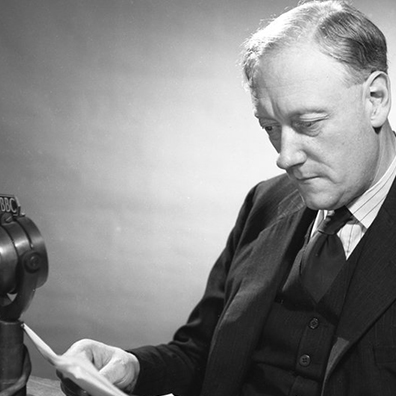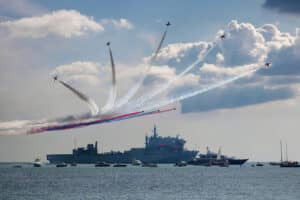
Ardent warriors – Submariners in WW2

These replacements, unfortunately, fall a bit short. For ardency denotes, like no other word can, a deeply intense and often admirable human quality—a fighting spirit that is crucial to those who are tasked in defending our nation.
Ardency is the trait that ties together all other martial skills. Interestingly though, we are not always sure how to live alongside it. While it is indeed the exact dedication that is essential in our military leaders, we as civilians can find its intensity and black-and-white approach to problems unsettling in peacetime. As a society we want ardency to come in just the right dose—neither too much nor too little.
Since 9/11 the world has seen a great deal of warfare and the public, no matter of what nationality, is not eager for even more talk of military matters. Naturally we are grateful to the men and women who serve on our behalf, yet there will always be that unfortunate gulf, that disconnect, between the intense experiences of soldiers hardened from the battlefield and the comfortable life of a civilian back home.
Lev Davidovich Bronstein, the birth-name of the Russian revolutionary known as Leon Trotsky, once said that “You might not be interested in war, but war is interested in you.” It is a phrase that is chillingly precise. History is the story of wars rolling over innocent and unsuspecting peoples. Call it Fate, but they had no say at all in the matter—if war sought them out there was nothing they could do.

Lev Davidovich Bronstein
better known as Leon Trotsky
The bitter irony of warfare is that historically it is older men who have decided to start wars, but the young who have to fight them. Perhaps in our modern era, as cyber warfare becomes the new threat to peace, things will be different, but I have my doubts. Inevitably, young men and women will have to fight our wars and we need them to be ardent of spirit when they do.
Although my experience with the world’s oceans has been limited to flying over them, this summer I picked up a half-dozen books on world war two submarine warfare. As a male, with the typical male reading habits of history and biography, my bookshelves groan under the strain of all the “war books” that I have piled upon them over the years. Yet these tales of war on, and under, the oceans were different—vastly different.
None of them could be considered great literature, but that was not the author’s intent. Instead, they are a collection of the most compelling narratives of about being a warrior that I have ever read.
Arguably, the greatest essay ever written about WW2, Losing the War, comes from the late Lee Sanlin. In this haunting piece, Sanlin describes how so many of the details of the war were simply forgotten as soon as the conflict ended. Sure, we remember the big events, but a lot of it has slid into oblivion.
Actually, this “selective forgetting” is understandable. We must live in the present and there is only so much “bandwidth” that we can dedicate to the past. With that said, I am glad these submarine books are still in print to pay homage to some of the fiercest warriors in history.
For their story is as honorable as it is frightening. They sailed over thousands of miles of ocean in their cramped weapons of war to fight a life or death battle of wits, technical skill, patience, hunting, and ever-present danger. We are accustomed to the Hollywood’s hyperbole when it comes to war stories, but the reality is that the submarine war was as terrifying as anything one can imagine.
They were the most ardent of warriors and they fought, with no exaggeration, to the death every time they sailed.
The captains of these “boats” (they did not call their submarines “ships”) were young, often just plus or minus thirty, and they shouldered immense responsibilities. Whether it was the Germans fighting in the Atlantic, North Sea, or Mediterranean in their U-boots or the Americans in their “Subs” in the Pacific, they fought in closed, cramped, and what we today would be considered nearly inhumane conditions.
With anywhere from 70 to 100 men packed into these submersible vessels (in actuality they really were surface ships that could submerge for less than 24 hours) there was no comfort, privacy, or even decent living conditions. The stench on board, after a week or so, was putrid. They faced fierce ocean storms, faulty torpedoes, and the constant danger of being hunted by enemy surface ships and aircraft and then depth-charged to death.
Yet if they survived their patrol, after a return to port to re-stock and re-arm, many immediately volunteered to go back and do it again. It is this aspect of their personalities, this desire to get right back into the fight, that marks them as belonging to a true warrior class. Their single goal was to sink enemy ships and everything else in their lives fell second to this purpose. Either they succeeded in their mission and returned to port or they died beneath the waves.
In 2020, from the comfort of our sofas and chairs, this level of ardency is almost unrecognizable. Ours is a world of compromises, roadblocks, indirectness, and gray areas. It is really difficult for us to think in such black and white terms.
Only three times in my life, while I was in uniform, did I meet men (and it could have just as easily been women) who I sensed were as ardent as the submarine captains and crews of WW2. All of these encounters were prior to 9/11 and I remember feeling oddly sorry for them—as if they were in a world that did not befit them. They were cut from a different timber than most of us and I must admit that they were, oddly, a bit uncomfortable to be around. Yet I knew that it was these persons, and no one else, who should lead the way should conflict arise.
This is in no way, of course, to say that the WW2 submariners were hard to deal with or were maladjusted during or after the war—not at all! Their post war accomplishments were impressive and reflect immense talent and character. In fact, experts have written that it was very difficult to determine who would excel in combat and afterward so guessing around personalities is perhaps a fool’s errand.
What I am thinking though, is that true warriors make us realize our shortcomings and their world is a different one from ours. They raise a high standard and it is hard for us mere mortals to keep pace.

Torpedo bays
from the submarine H.M.S. Otus
For example, these books are relentless with their endless details of how these men fought and attacked enemy shipping. There is page after page of the routines of diving and surfacing, compass headings, attack plots, and directions to the crew for speed and course.
Frankly, I found this reading at times to be tedious, but then it dawned on me that this relentless detail is exactly the point. This type of warfare was relentless. It was grueling and dangerous work that required a special breed of warrior—an ardent warrior.
So how does this tie into Trotsky and what does it have to do with the average citizen? Well first, as Trotsky noted, war will always be “interested” in us and we are never really completely safe from it. This means that we, in the community of free nations, need ardent warriors to carry out the task of defending us and winning our wars.
Second, just because we want our warriors to be fierce and dedicated does not mean that we subscribe to the idea that extremism in the defense of liberty is allowed—we should not mistake ardency for wanton lawlessness. If we were to do that, we would lose a part of our sense of identity as a just society.
Yet it is an unavoidable truth that we demand more from our warriors than we do of ourselves. We are often strangers to the high standards of a warrior’s ethos and can find its rigidity not always suited for the variety of problems we face as a society. While this sounds almost unfair, it reflects the immense responsibilities that we put on the shoulders of the young adults we send into battle.
War, of course, is a brutal and dirty business and to expect our fighters to be angels is unrealistic. Trotsky was right however, and so when war does come to call, we want to know exactly the temperament and character of those who will answer the tocsin’s call.
By the way, thousands of these submariners never returned from their patrol and died somewhere in the depths of the world’s oceans. May they rest in peace.
![]()
Note: A few of the books that I read for this post:
Clear the Bridge by Commander Dick O’Kane, Run Silent Run Deep by Captain Edward Beach, Submarine also by Beach, and Operation Drumbeat by Michael Gannon which describes the havoc the German U-boots visited upon allied shipping in the Atlantic.







Finally found it in my mail Neal, but would have missed it if you hadn’t mentioned it. I’ve got to get rid of some of the overwhelming spam flooding my mailbox every day!! I too go through “war reading” phases, from submariners to USMC in WW2.